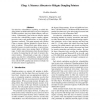125
click to vote
USS
2010
15 years 3 hour ago
2010
Oppressive regimes and even democratic governments restrict Internet access. Existing anti-censorship systems often require users to connect through proxies, but these systems are...
113
click to vote
USS
2010
15 years 3 hour ago
2010
Reverse Turing tests, or CAPTCHAs, have become an ubiquitous defense used to protect open Web resources from being exploited at scale. An effective CAPTCHA resists existing mechan...
119
click to vote
USS
2010
15 years 3 hour ago
2010
Use-after-free vulnerabilities exploiting so-called dangling pointers to deallocated objects are just as dangerous as buffer overflows: they may enable arbitrary code execution. U...
123
click to vote
USS
2010
15 years 3 hour ago
2010
One of the main obstacles for the wider deployment of radio (RF) distance bounding is the lack of platforms that implement these protocols. We address this problem and we build a ...
USS
2010
15 years 3 hour ago
2010
Search engines not only assist normal users, but also provide information that hackers and other malicious entities can exploit in their nefarious activities. With carefully craft...
130
click to vote
USS
2010
15 years 3 hour ago
2010
Idle port scanning uses side-channel attacks to bounce scans off of a "zombie" host to stealthily scan a victim IP address and determine if a port is open or closed, or ...
117
click to vote
USS
2010
15 years 3 hour ago
2010
We study the security and privacy of private browsing modes recently added to all major browsers. We first propose a clean definition of the goals of private browsing and survey i...
117
click to vote
USS
2010
15 years 3 hour ago
2010
Capsicum is a lightweight operating system capability and sandbox framework planned for inclusion in FreeBSD 9. Capsicum extends, rather than replaces, UNIX APIs, providing new ke...
125
click to vote
SRDS
2010
IEEE
15 years 6 hour ago
2010
IEEE
We introduce the notion of a swift algorithm. Informally, an algorithm that solves the repeated consensus is swift if, in a partial synchronous run of this algorithm, eventually no...
134
click to vote
SRDS
2010
IEEE
15 years 6 hour ago
2010
IEEE
Abstract--Fault localization in enterprise networks is extremely challenging. A recent approach called Sherlock makes some headway into this problem by using an inference algorithm...






